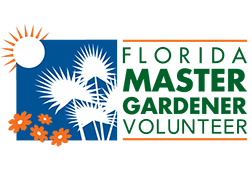March 17-23 is Florida Master Gardener Volunteer Week, and UF/IFAS Extension offices across the state are celebrating the power of these highly knowledgeable, highly motivated horticultural ambassadors.
You may have met one at a plant sale or spring garden show. Or maybe your child told you about a school visitor who showed the class how to plant a garden. You may follow their advice in a newspaper column or on a local morning show. They’re Florida Master Gardener Volunteers (MGVs) and they are Extension rock stars.
One of Extension’s primary missions is to help homeowners learn how to start their own gardens and establish landscapes that are beautiful and sustainable. It’s what Florida-Friendly LandscapingTM is all about. FFL is a phenomenally successful program, but the demand for information far exceeds what Extension horticulture agents can provide. In order to get the word out about creating beautiful, Florida-friendly gardens, we rely on the expertise of our Master Gardener Volunteers.
MGVs are ordinary people with an extraordinary love for plants and a zeal for helping people. But being an MGV also takes extraordinary commitment. Each volunteer receives over 70 hours of training from UF/IFAS Extension faculty in botany, plant science and other topics. They then go out to perform 75 hours of volunteer work in their first year, with an additional 10 hours of training and 35 volunteer hours each following year.
MGVs are a familiar and welcome presence in schools, garden clubs, plant clinics, nurseries, and local events, sharing their knowledge to make our communities more livable, more sustainable, and more beautiful. All you have to do is ask for their help.
The country’s first Master Gardener volunteer program was established by Washington State University Extension in 1972. The title “Master Gardener” was borrowed from the German “Gartenmeister”, a term for those with high proficiency in the horticultural arts.
In 1975, UF/IFAS vegetable crops specialist Dr. James Stephens was escorting a group of 4-H and FFA students on a boat tour of Kings Island, Mississippi when a USDA agent told him about the Master Gardener program at Washington State. This was followed in 1977 by a trip to the Pacific Northwest to see the program in action. By that time, WSU’s Master Gardener program had caught on in Oregon, Colorado, Montana, Alaska and New York.
Finally, in 1979 the Master Gardener Program got under way in Florida. That year, 58 trainees completed eight weeks of instruction to become certified as Master Gardeners and began volunteer work in Brevard, Manatee and Dade counties. Many in that first graduating class far exceeded their volunteer service requirements, with two Masters Gardeners in Manatee County performing between them a total of 450 hours of service in a single year!
Florida celebrates 45 years of Master Gardener Volunteer program
Fast forward to 2023 — 3,359 Master Gardener Volunteers were active in 58 counties around the state; collectively they’ve contributed 339,600 in service hours to their communities, a value of nearly $10 million.

The Florida Master Gardener Volunteer Program has been so successful that it has inspired a number of offshoots and other volunteer training programs, including Junior Master Gardeners, the Florida Master Naturalist Program, Florida Master Beekeepers and Florida Master Money Mentors.
In its 45 years, the Master Gardener Volunteer program has grown from being a welcome relief for overworked agents to being one of the most visible and respected representatives of Florida Cooperative Extension.
To learn more about the Florida Master Gardener Volunteer Program, visit https://gardeningsolutions.ifas.ufl.edu/mastergardener/

 0
0
